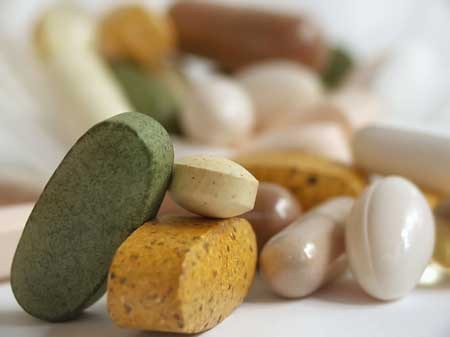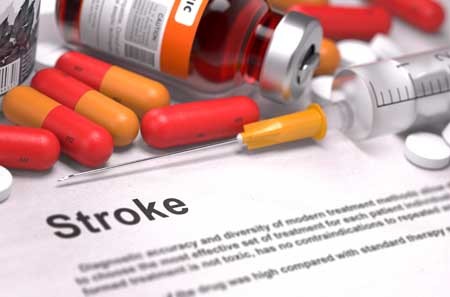Certain ‘Nutraceuticals’ Aid Depression Treatment
A systematic review of research on the value of pharmaceutical-grade nutritional supplements, or ‘nutraceuticals,’ in depression treatment has found that several do indeed improve depression symptoms.
The 2016 review by Jerome Sarris and colleagues in the American Journal of Psychiatry found that the following nutraceuticals primarily produced positive results compared to placebo: omega-3 fatty acids (primarily EPA or ethyl-EPA); vitamin D; l-methylfolate (a more potent form of folic acid); and S-adenosyl methionine or SAMe, a beneficial compound created from toxic homocysteine with the help of folate.
Editor’s Note: Most of these compounds can also be useful in bipolar depression. Omega-3 fatty acids and vitamin D are helpful to many patients. L-methylfolate is particularly helpful to the 30% of the population with a MTHFR deficiency that interferes with the ability of folate to break down homocysteine. SAMe is an exception—while it is effective in unipolar depression, it may cause switching into mania in patients with bipolar disorder.
The researchers identified a few additional nutraceuticals that each had one study supporting their use—creatine, sometimes used by weightlifters to provide extra energy to muscles; folinic acid, which can protect bone marrow and other cells during chemotherapy; and a combination of amino acids.
Results from studies that compared other compounds to placebo were mixed. Those included studies of zinc, folic acid, vitamin C, and the amino acid tryptophan. A study of inositol, a compound found in plants that is not normally digestible, had nonsignificant results.
No serious side effects were observed in any of the studies of nutraceuticals, though some caused minor digestive disturbances.
Editor’s Note: Another beneficial nutraceutical that did not appear in the review article is N-acetylcysteine. In 6- to 8-week studies, NAC improved depression and anxiety compared to placebo. It also improved bipolar depression and reduced many habits and additions in non-bipolar patients. These include cocaine and gambling addition, alcohol and nicotine use, trichotillomania (compulsive hair-pulling) and obsessive compulsive disorder (OCD).
Tart Cherry Juice Improved Recovery from Exercise in Soccer Players
A recent study found that tart cherry juice helped soccer players recover after muscle-damaging exercise better than a placebo.
The 16 athletes in the study were randomly assigned to receive either a Montmorency tart cherry concentrate mixed with water twice a day for four days prior to and three days following exercise, or a drink with the same number of calories but less than 5% fruit content on the same schedule.
The semiprofessional male soccer players (aged 21 to 29) showed better performance on sprints, jumps, and agility tests; less inflammation; and less muscle soreness when taking tart cherry juice compared to the placebo drink.
Editor’s Note: Tart cherry juice is rich in polyphenols, chemicals found in plants with anti-oxidant effects. The juice also has melatonin-like effects, improving sleep in people with insomnia.
Cinnamon Improves Memory in Mice
A recent study found that mice that ate more cinnamon got better and faster at learning. In the study, published in the Journal of Neuroimmune Pharmacology in 2016, separated mice into good learners and poor learners based on how easily they navigated a maze to find food. After the poor learners were fed cinnamon for a month, they could find the food more than twice as quickly as before.
The benefits of cinnamon come from sodium benzoate, a chemical produced as the body breaks down the cinnamon. Sodium benzoate enters the brain and allows the hippocampus to create new neurons.
Feeding cinnamon to the poor learning mice normalized their levels of receptors for the neurotransmitter GABA, closing the gap with good learners. Sodium benzoate also improved the structural integrity of some brain cells. Cinnamon also can help sensitize insulin receptors.
Doctors hope these findings may eventually contribute to treatment research on Alzheimer’s and Parkinson’s diseases.
Cinnamon should be consumed in moderate quantities because the Chinese variety most commonly found in North American supermarkets has high levels of coumarin, a compound that can be toxic to the liver when consumed in large quantities. Ceylon (Sri Lankan) cinnamon has lower levels of coumarin.
Vegan Diet Can Lead to Vitamin B12 Deficiency
Vitamin B12 deficiency is a risk associated with a vegan diet. B12 deficiency can lead to depression, anemia, and even irreversible neuron damage, according to researcher Drew Ramsey, who spoke on the topic at the 2016 meeting of the American Psychiatric Association.
A study of vegans showed that 52% were deficient in vitamin B12, while another 23% had insufficient levels of the vitamin. B12 is found in the highest concentrations in certain seafoods and liver. It is also found in dairy products, eggs, fortified breakfast cereals, and is available in supplement form.
Women who eat a vegan diet while pregnant may not be providing their offspring with enough nutrients, according to researcher Emily Deans, who also spoke at the meeting. A case report on 30 vegan mothers found that 60% of their offspring had developmental delays and 37% showed cerebral atrophy.
Deans said that eating no meat is associated with higher rates of depression, anxiety, and worse quality of life.
Ramsey believes that while the North American diet is probably weighted too heavily toward animal products, seafood remains an important source of B12.
Eat More Plants for Health
A long-term study of 130,000 nurses and other health professionals found that eating more plants lowered risk of death over several decades. A 3% increase in calories from plant protein was associated with a 10% lower risk of death during the study period.
The research, by Mingyang Song and colleagues in the journal JAMA Internal Medicine, found that the more animal protein consumed, the higher the risk of death from cardiovascular disease during the study. A 10% increase in the proportion of calories from animal protein was associated with a 2% increase in deaths. This association was worse for people who were obese or heavy drinkers.
Song and colleagues suggest that plants are a better source of calories than are animal products, and that fish or chicken are better choices than processed red meat.
Researcher Dariush Mozaffarian recommends eating plant-based foods like fruits, nuts, seeds, beans, and non-starchy vegetables, but avoiding those like French fries or white bread that have little nutritional value.
Schizophrenia Drug May Treat ADHD with Impulsive Aggression
The atypical antipsychotic drug molindone was used to treat schizophrenia for decades before it was pulled from the market in 2010 for business reasons. Now Supernus Pharmaceuticals is studying whether a reformulation of the drug may be used to treat attention deficit hyperactivity disorder (ADHD) that is accompanied by impulsive aggression.
Supernus tested an extended-release form of the drug in 118 children aged 6–12 with ADHD and impulsive aggression. They received either placebo or between 12mg and 54mg per day of molindone for 39 days. Those children who received between 12mg and 36mg per day of molindone showed fewer symptoms of impulsive aggression that those who received placebo. Side effects included headache, sedation, and increased appetite. Clinical trials of molindone will continue.
SNRI Viloxazine May Be Reintroduced as ADHD Treatment
The pharmaceutical company Supernus identifies older drugs that may be repurposed to treat other disorders. The company believes it may have found a new use for the discontinued antidepressant viloxazine, as a treatment for attention deficit hyperactivity disorder (ADHD).
Viloxazine is a selective norepinephrine reuptake inhibitor, or SNRI, that was approved in Europe but not in the US and was eventually removed from the market due to competition from other drugs. Its structure and mechanism of action resemble those of the ADHD treatment atomoxetine, so Supernus has begun trials of viloxazine for ADHD in adults.
At the 2015 meeting of the American Academy of Child and Adolescent Psychiatry, the researchers reported that compared to placebo, viloxazine was about twice as likely to reduce ADHD symptoms. Side effects included nausea, decreased appetite, headache, and insomnia. Supernus hopes to create an extended release form of the drug for both adults and children.
Inflammation Linked to Post-Stroke Depression
A 2016 study in the journal Psychoneuroendocrinology confirms that high levels of inflammatory cytokines in the blood are linked to higher risk of depression following a stroke.
The study, by Hee-Ju Kang and colleagues, followed 222 stroke sufferers for one year. Two weeks following the stroke, their levels of inflammatory cytokines IL-6 and IL-18 were measured. They were also assessed for depression both at the two-week point and one year later. The researchers also observed whether or not the participants were treated with statins, which are often prescribed to lower stroke risk and also have anti-inflammatory effects.
Those participants who had depression following their strokes (either at two weeks or at one year) tended to be older, to have a history of depression or stroke, to have a more severe stroke, and to have a stroke location toward the front of the brain.
Having any depression following the stroke was associated with higher levels of IL-6 and IL-18. This was particularly true of those participants who were not taking a statin. Among those taking statins, the statins may have interfered with the link between inflammatory cytokines and post-stroke depression. In the statin group, the only significant finding was a link between levels of IL-6 and depression at the two-week mark.
Depression Elevates Stroke Risk
Depression has been linked to increases in medical problems such as cardiovascular disease. A new study shows that depression is linked to increased risk of stroke, even when symptoms of depression are in remission.
The 2015 study, by Paola Gilsanz and colleagues in the Journal of the American Heart Association, focused on health and retirement. It included over 16,000 adults aged 50 and up who were interviewed every two years about their health history.
Previous studies have shown a link between depression and stroke risk. Like those studies, the study by Gilsanz and colleagues found that people who were depressed during two consecutive interviews were more than twice as likely to have a stroke in the subsequent two-year period than those who reported few depressive symptoms in the first two visits.
What is new is that in this study, people who were depressed in the first interview but not in the second interview were still at 66% greater risk for a stroke than those with no depression. Those who were depressed only during the second interview not at greater risk for a stroke, implying that depression takes more than two years to affect stroke risk.
Gilsanz and colleagues suggest that they don’t know how depression, remission, and stroke risk interact over the longer term. It is possible that stroke risk diminishes the longer a patient’s depression stays in remission.
It is not clear why depression increases strokes, though some have speculated that depression causes irregular heartbeats. There is not as yet any support for that theory, but high blood pressure, rigid veins, or sticky platelets may be other explanations.
Smoking Ban in New Jersey Jails Drastically Reduced Deaths of Inmates with Mental Illness
Policy changes by the New Jersey Department of Corrections drastically reduced the availability of tobacco products in New Jersey jails between 2005 and 2014. Prison commissaries reduced their stock of tobacco, prices increased, sales to minors were banned, and facilities were designated tobacco-free (including for staff and visitors).
Along with this reduction in the availability of tobacco products, the Department of Corrections also introduced smoking cessation programs, began offering nicotine replacement lozenges in commissaries, and increased treatment for tobacco use.
A surprise consequence of the decision to go tobacco-free was a drastic reduction of deaths among prison inmates with mental illness. The mortality rate for these inmates dropped by 48%. In contrast, the mortality rate for inmates without mental illness remained flat before and after the tobacco ban.
People with mental illness are at increased risk of mortality, particularly from cardiovascular illnesses. Now it seems that eliminating tobacco use can go a long way toward improving health and reducing mortality for these people.











